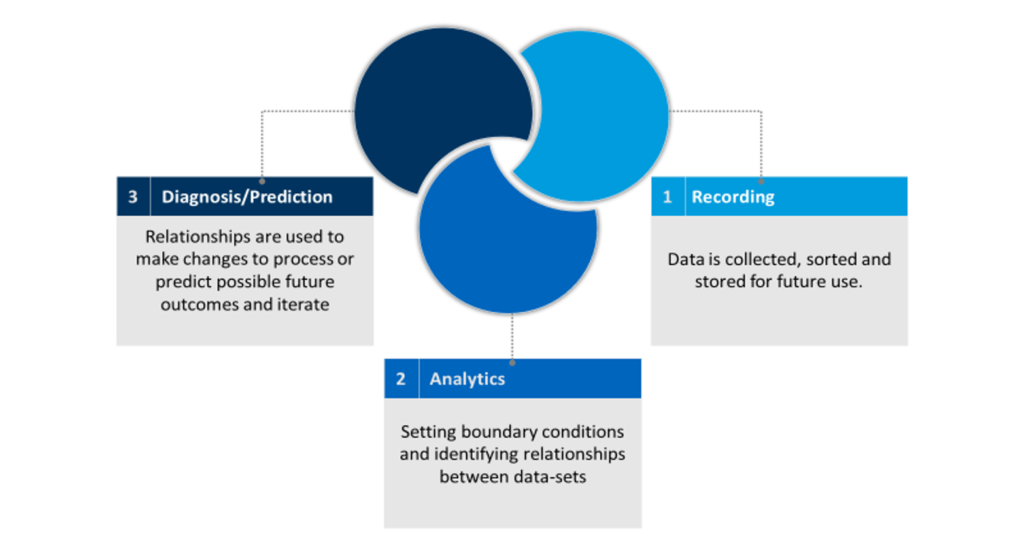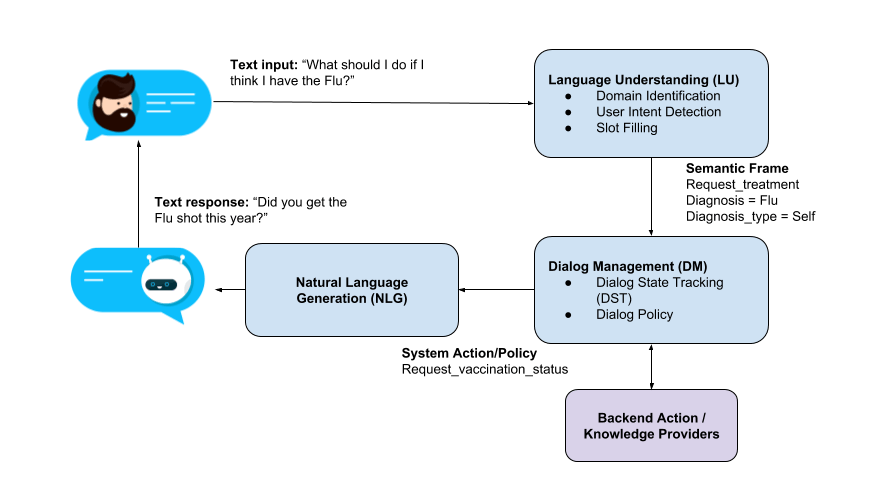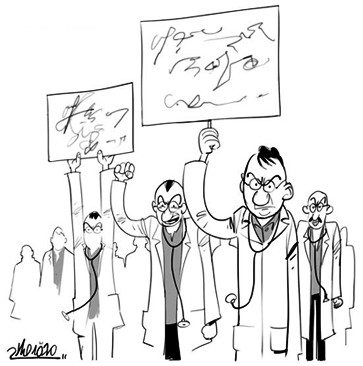“What do you mean, Doctor?!”

Machine Learning (ML) is changing the way healthcare systems operate, both in terms of internal processes and patient-facing interventions. How effective will it prove in the long run and will it be a tool to aid or a tool to replace traditional operations – these are the questions that the healthcare industry faces today.
We are at a crucial point in our history today – harnessing the potential of data to fuel technological innovation [i]. While the theory behind advanced data-sciences is decades old, we are now no longer limited by technology and data collection hurdles and can use more efficient processes to analyse data. ML has started gaining traction in traditional industries- from helping predict the next maintenance requirement at a power plant all the way to detecting and preventing financial fraud in real-time[ii]. It has helped entire industries evolve their operations to make them more proactive, rather than reactive, and made organizations much more efficient.

In industries where the first step above has never been a hurdle (think production facilities or financial institutions), ML has unlocked potential faster. In traditional industries like healthcare, where data collation has been a challenge – both in terms of quality and quantity – availability is only starting to improve through the increasing use of Electronic Medical Records (EMRs) and Electronic Health Records (EHRs). ML in healthcare has also limited itself to more analytical and pattern-recognition applications[iii]. The most commonly cited examples are those of computers being trained on a large number of images/scans to identify cancerous tumours or abnormalities[iv], [v] and to aid in the drug discovery process[vi].
ML’s true potential as a technique has always been the ability to draw insights – analyzing sets of data to give users a more diagnostic picture, which can then be furthered to share a degree of predictive recommendations (a.k.a – treatment!).
Sounds familiar? Because what I have just described is the standard medical process and patient journey of analysis, followed by diagnosis and treatment recommendations. In this scenario, the doctor is training herself through her experience. These patients are shaping her ‘learning’ and helping her build an intuition of sorts that gets applied then to all subsequent cases that she comes across. It isn’t without reason that her work is referred to as a medical ‘practice’.
“It’s been said before that the best ML tool in healthcare is the doctor’s brain.”[iii]
It is this equivalency with modern day ML that brings us to the core issue surrounding the applications of ML in healthcare. How can ML be harnessed to augment the skills of a medical practitioner, instead of threatening to replace that stakeholder completely?
Curai and Natural Language Processing (NLP)
One of the ways to approach the question above is to look at what the limitations of a traditional medical practitioner are, and can ML be used to solve them. A couple of such challenges are:
- The availability of diverse patient populations to train doctors on
- Keeping oneself updated with all recent advances in one’s area of medical practice
Curai is a start-up that uses ML in the form of Natural Language Processing to train itself on delivering relevant primary care information to both patients and doctors, enabling a more efficient conversation between these stakeholders [vii]. At its core, Curai, through partnerships with reputed medical institutes and other knowledge partners, collates patient-doctor conversation data and matches it with medical histories (through EMRs and EHRs) to build a working knowledge of primary care diagnostics[viii]. This is used to help patients entering the healthcare universe with an understanding of their symptoms/conditions that is accurate and based in sound medical knowledge.

- Improving primary-care access – Through sufficient training, the AI will be able to provide sound medical advice for people across the globe with limited access to doctors[ix]
- Medically relevant response/question suggestion – Using the information available from a patient and matching it with possible outcomes, Curai could guide the probing questions from a doctor to arrive at a core diagnosis much faster
- Improve patient compliance – with the ability to refer to Curai, patients will find it easier to understand and comply with recommended treatment protocols
A key issue for Curai will be to stay at the forefront of medical knowledge and continue to learn and extract relevant meaning from a patient’s inputs. It will also be crucial to position it as an enabler for medical practitioners that improves access and builds better relationships between doctors and patients.

Questions for Curai
It is obvious that Curai is leaps and bounds ahead of “patients googling their own symptoms”. The team must deal with several critical questions that I would love to hear more thoughts on.
- Will patients ever be willing to trust diagnosis/suggestions from ML driven platforms, without any human intervention?
- What will the regulatory framework look like to govern platforms such as Curai, and where will the accountability lie?
Will the system ever be able to gain contextual intelligence around a patient (the way a family physician knows your and your family’s complete medical history) and use it to make rational suggestions?
Word Count: 799
————————————————————————————————————————————-
[i] E. Brynjolfsson and A. McAfee, What’s driving the machine learning explosion?, Harvard Business Review Digital Articles, July 18, 2017.
[ii] Bernard Marr, 27 Incredible Examples Of AI And Machine Learning In Practice, www.forbes.com, Aprl 30, 2018, https://www.forbes.com/sites/bernardmarr/2018/04/30/27-incredible-examples-of-ai-and-machine-learning-in-practice/#44cc7a1b7502
[iii] Ed Corbett, The Real-World Benefits of Machine Learning in Healthcare, www.healthcatalyst.com, https://www.healthcatalyst.com/clinical-applications-of-machine-learning-in-healthcare
[iv] Lisa Krieger, Google computers trained to detect cancer, www.mercurynews.com, March 3, 2017, https://www.mercurynews.com/2017/03/03/google-computers-trained-to-detect-cancer/
[v] Dan Shewan, 10 Companies Using Machine Learning in Cool Ways, www.wordstream.com, May 3, 2018, https://www.wordstream.com/blog/ws/2017/07/28/machine-learning-applications
[vi] Daniel Faggella, Machine Learning Healthcare Applications – 2018 and Beyond, www.techemerge.com, November 12, 2018, https://www.techemergence.com/machine-learning-healthcare-applications/
[vii] Matthew Lynley, Curai picks up $10.7M to create a smarter system to help patients supply the best info for their doctors, www.techcrunch.com (Blog), May 2018, https://techcrunch.com/2018/05/30/curai-picks-up-10-7m-to-create-a-smarter-system-to-help-patients-supply-the-best-info-for-their-doctors/
[viii] Xavier Amatriain, NLP & Healthcare: Understanding the Language of Medicine, www.medium.com (Blog), November 5, 2018, https://medium.com/curai-tech/nlp-healthcare-understanding-the-language-of-medicine-e9917bbf49e7
[ix] Neal Khosla, Using AI to Scale the World’s Best Healthcare to Every Human Being, www.medium.com (Blog), May 30, 2018, https://medium.com/curai/using-ai-ml-to-scale-the-worlds-best-healthcare-to-every-human-being-8cbc56df21d6



To answer question 1, I think the answer is no. Curai sounds like an interesting premise, but I do not see it surmounting the bond of trust that patients seek from their providers. Instead, I think the underlying ML tech that Curai uses might better be put to use as a means of training new doctors to know what to look for when conversing with patients. With a large enough data set, Curai may be able to pinpoint certain triggers that will alert doctors to probe for more information or conduct tests, rather than having Curai interact with patients on its own. By doing this, the ML tech can assist in providing better care while avoiding the insurmountable challenge of gaining trust with human patients
Extremely interesting topic! My concern is linked to the first question that you pose here (will patients ever be willing to trust diagnoses/suggestions from ML-driven platforms without human intervention). My belief is that patients will indeed be willing to trust those suggestions, but that those suggestions may not often be accurate. For example, I see patients all the time who come into the doctor’s office with a false perception of what they might have thanks to WebMD. While I recognize that Curai might eventually be more accurate and useful to patients than WebMD given its use of machine learning techniques, I still have concerns regarding its ability to give patients sound medical advice. Medical questions are often nuanced and require detailed physician evaluations to answer them properly (e.g., with physical examinations and laboratory testing). Accordingly, I think it will be difficult to have Curai appropriately answer technical medical questions, and as a result patients will be left worrying that they could have a serious diagnosis (e.g., cancer) that may not be based in reality.